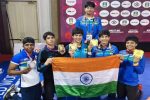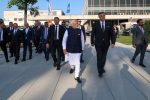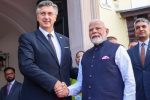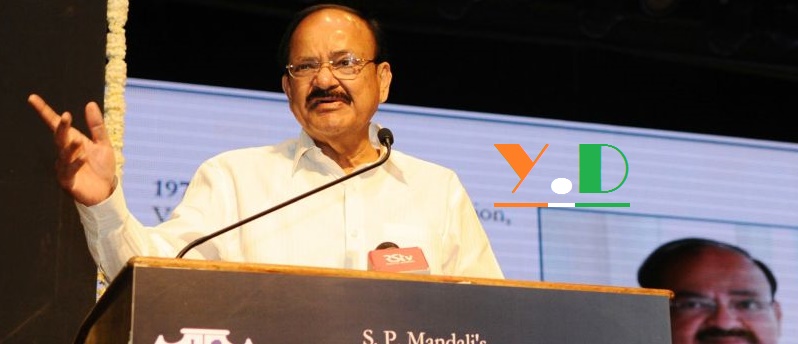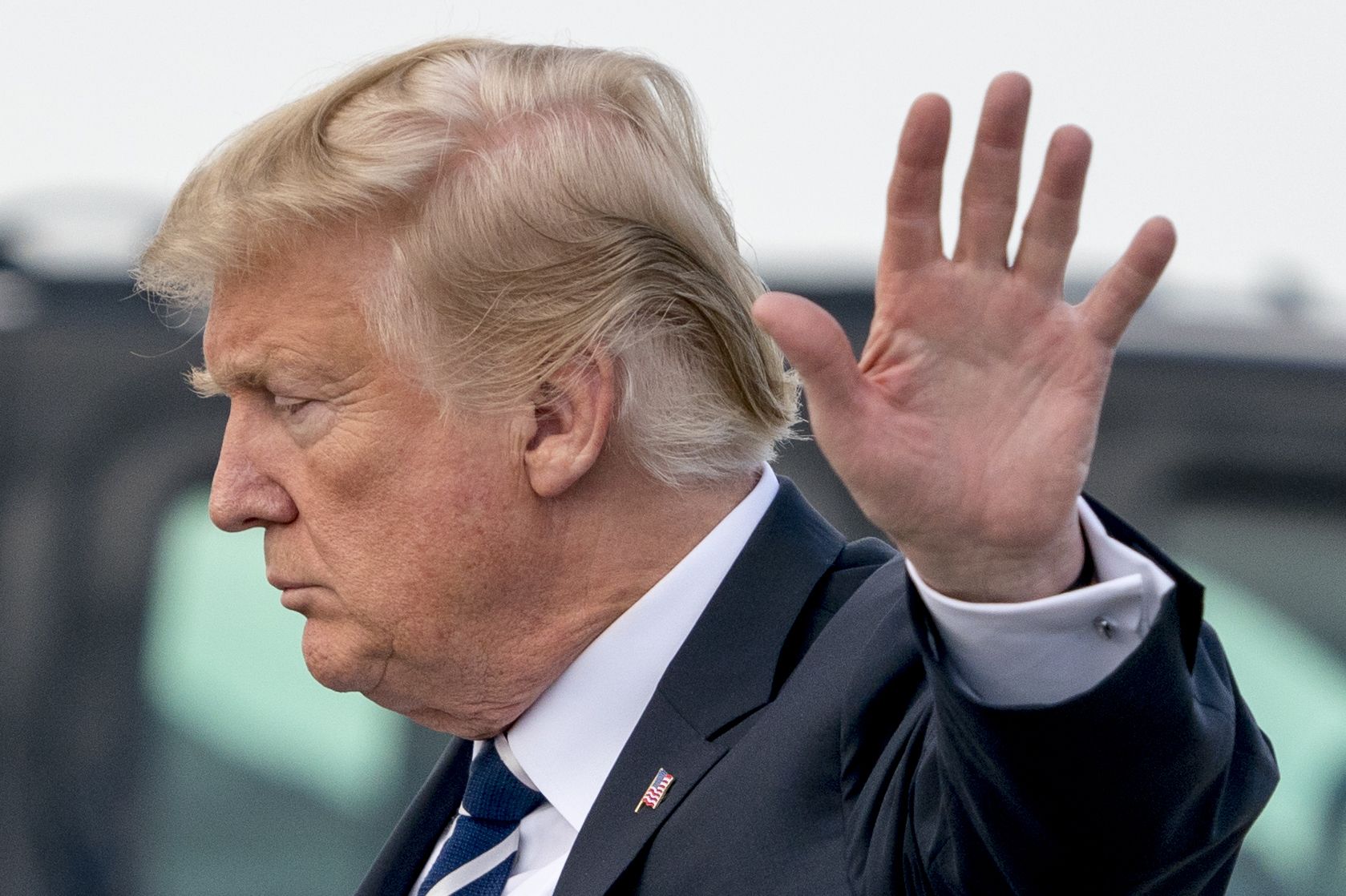Lack of employable skills in most of our graduates is a challenge;
Ensure that our youth develop capabilities for critical and analytical thinking;
Addresses the valedictory function of Golden Jubilee celebrations of Hindustan Group of Institutions
The Vice President of India, Shri M. Venkaiah Naidu has said that India needs education system with greater emphasis on Indian history, heritage and culture. He was addressing the valedictory function of the Golden Jubilee celebrations of Hindustan Group of Institutions, in Chennai yesterday. The Governor of Tamil Nadu, Shri Banwarilal Purohit, the Minister for Fisheries, Personnel and Administrative Reforms, Shri D. Jayakumar and other dignitaries were present on the occasion.
The Vice President said that education system must inculcate strong ethical, moral and humanistic values. While acquiring knowledge from across the globe, the students must remain rooted to India’s glorious culture, traditions, ethos and heritage, he added.
Recalling the profound words of Mahatma Gandhi ji, the Vice President said that “Literacy in itself is no education. Literacy is not the end of education or even the beginning. By education, I mean an all-round drawing out of the best in the child and man-body, mind and spirit”. He further said that Education does not end with mere acquisition of knowledge or degrees. It is aimed at holistic development of an individual, who will be able to face the challenges of a fast-changing world with vision of a seer and temperament of a scientist, he added.
The Vice President said that education must help in building the character, capacity, calibre and promoting proper conduct. He further said that education is for empowerment, enlightenment, enhancement of knowledge and to seek gainful employment. People in education sector should address the critical issues in our education system like high dropout ratio especially at secondary and tertiary level, obsolete syllabus and conventional pedagogy, lack of industry-institute linkage, lack of research awareness and shortage of trained teachers.
Following is the text of Vice President’s address:
“I am very much delighted and pleased to attend the valedictory function, marking the culmination of year-long Golden Jubilee celebrations of Hindustan Group of Institutions.
I am delighted to note the tremendous growth of the Hindustan Group of Institutions which was started in 1966 as a small vocational training Institute, offering non-formal technical education and training. Today, the group is offering a wide spectrum of programmes from Diploma to Ph.D across several disciplines.
As you are aware, the prestige and future of a country depend on the calibre of its educational and research institutions, the traditions it has established and the value system it has ensured over the years. Education plays an important and crucial role in the realisation of our nation’s aspiration for social progress, economic growth and technological advancements.
Sisters and Brothers,
The formal education system in our country has its roots in the colonial regime, where educational institutions were mostly meant to train people for specific needs of the British government of those days. The common man had no access to institutions of higher learning, which were limited to foreigners and elite Indian society. As a result, vast majority of population remained confined to agriculture and various unskilled sectors.
Following Independence, the challenge before the country’s leaders was daunting. Institutions across the country had to be built to make education accessible to every section, particularly the poor and the downtrodden. Undoubtedly, education is the only tool to eradicate illiteracy, empower people and liberate the country from social and economic backwardness.
Education is for empowerment, enlightenment, enhancement of knowledge and to seek gainful employment.
Sisters and Brothers,
India was once known as ‘Viswaguru’ and was the global center of learning as knowledge-seekers from all corners of the world used to flock to India to study at Takshashila, Nalanda and other centres of learning. The situation has changed following foreign invasions and the British colonization and the time has come for India to once again emerge as the global knowledge hub.
The time has come for us to come out of colonial mindset. This is possible only through proper education system with greater emphasis on Indian, history, heritage and culture.
Our education system must inculcate strong ethical, moral and humanistic values. While acquiring knowledge from across the globe, the students must remain rooted to India’s glorious culture, traditions, ethos and heritage. Here, I would like to recall what was stated by Mahatma Gandhi ji : “I do not want my house to be walled in on all sides and my windows to be stuffed. I want the culture of all lands to be blown about my house as freely as possible. But I refuse to be blown off my feet by any.”
I have always been impressing upon the need for children to be taught in their respective mother tongues in various States to underscore the importance of language. I look forward to the day when professional courses like MBBS are also taught in local languages.
Since Independence, the country has made remarkable progress in various fields, thanks largely to the strong educational foundations laid by the governments at the Centre and in various States. However, even 70 years after independence, we are still grappling with the problem of illiteracy, which is higher among women than men. This problem has to be tackled on a war footing in a mission mode with clear-cut timelines so that universal literacy is achieved at the earliest.
Here, I would like to once again recall the profound words of Mahatma Gandhiji—“ Literacy in itself is no education. Literacy is not the end of education or even the beginning. By education, I mean an all-round drawing out of the best in the child and man—body, mind and spirit”.
Education does not end with mere acquisition of knowledge or degrees. It is aimed at holistic development of an individual, who will be able to face the challenges of a fast-changing world with vision of a seer and temperament of a scientist. It should help in building the character, capacity, calibre and promoting proper conduct.
Sisters and Brothers,
Today, we have 864 universities and around 51000 institutions of higher learning in 2016-17.
Though India has the third largest education system in the world, our average Gross Enrolment Ratio (GER) is still at 25 per cent, lower than many of the developing economies in the world, mainly due to the lack of adequate educational infrastructure and financial resources to cater to our large population.
The government has set a target of achieving minimum 30 per cent average GER by 2020 which translates to 40 million students. To achieve this challenge, we need a paradigm shift from the conventional approach with focus on innovation and new teaching and learning methods.
While optimising our existing capabilities and capacities, we need to improve quality of education through national and international linkages, use of ICT in a big way, promoting e-learning and virtual class rooms. Public-private partnership in education sector is also important to improve GER and offer world class education to our youth to compete with the rest of the world.
We need to address the critical issues in our education system like high dropout ratio especially at secondary and tertiary level, obsolete syllabus and conventional pedagogy, lack of industry-institute linkage, lack of research awareness and shortage of trained teachers.
It is worth mentioning that Tamil Nadu state has achieved the highest GER of 46.9 per cent in 2016-17 as per MHRD survey report against the National average of 25.2 per cent. The education ecosystem in Tamil Nadu is stated to be among the best in the country, especially for professional education. The private sector has been playing a crucial role in this regard.
However, even though we have large number of higher educational institutions, most of our institutions and universities are not able to compete with other global universities, which is evident from the world university rankings. The Government took a serious note of this and Honourable Prime Minister has announced a financial assistance of Rs.10,000 crore to 20 institutions in both private and public sector for a period of 5 years to achieve world class university status.
Another alarming challenge we face is the lack of employable skills in most of our graduates. Only around 15 per cent of our graduates are equipped with the required professional skills and knowledge. One of the main objectives of education is to equip the youth with employable and entrepreneurial skills. It should create assets in the form of knowledge and skills which is referred to as human capital. We need to empower our youngsters with requisite skills to gain and retain appropriate gainful employment.
Apart from technical/vocational skills, we also have to impart better communication and problem-solving skills. We need to ensure that our youth develop capabilities for critical and analytical thinking. I am glad that Hindustan Group of Institutions is focusing on job-oriented courses and vocational training.
Notwithstanding the constraints, India is now well known for its large pool of technical man power. We have witnessed a boom in BPO/KPO segment apart from our proven capabilities in IT/ITES sector, core manufacturing like steel, automobile, heavy machineries, medical care & health and hospitality sectors. We need to focus on providing more of such educational and training opportunities to our youth.
It is heartening to know that Hindustan Institute of Technology and Science, the deemed university under the group, has several research, academic and training partnerships with many leading universities and industries in India and abroad. The university is accredited by NAAC with ‘A’ grade and has secured ‘Three star’ rating in QS World ranking.
I also commend the Government of Tamil Nadu for its commitment to the cause of providing quality education to the youth and thus empowering them for a better future.
I am delighted to note that the Hindustan Group of Institutions with over 15,000 students and 1500 faculty on its rolls, is completing 50 years of dedicated service to the nation. The dedication and commitment you have shown all these years will be remembered through the students who passed out from the various institutions under the group.
On this occasion, let us remember the leadership and guidance provided by the founder of this group of institutions, late Dr. K.C.G. Verghese.
I extend my best wishes to all of you on this joyous occasion.
JAI HIND!”













